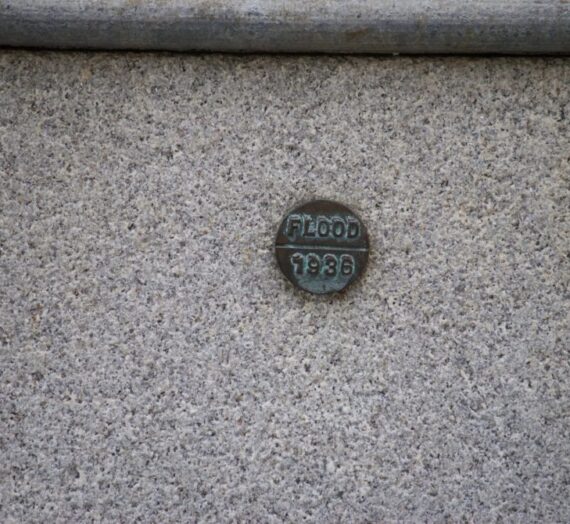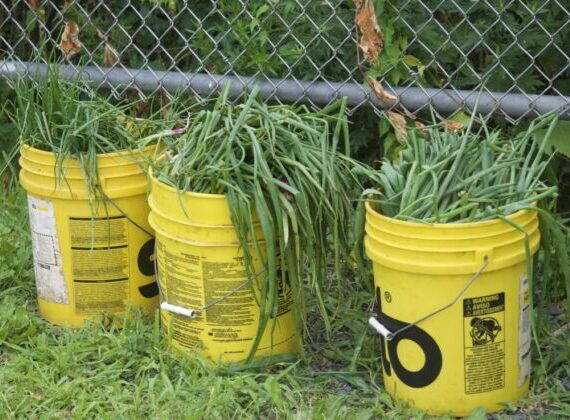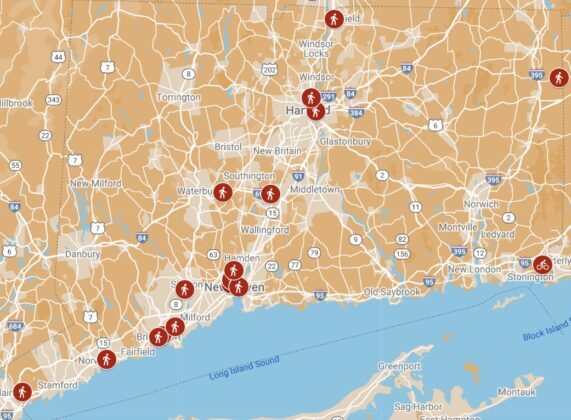After less than an hour of rain, sometimes heavy, I watched as water poured down a hilly road, leaving enormous puddles at the bottom, at a size that people could not drive around to avoid. Where was this? Doesn’t much matter. It’s the same old story: an area that was previously a rural outskirts, farms and woods, was quickly built up in an era when creating more homes, rapidly and nearly anywhere, was prioritized above all else. It was a time of people doing whatever they could because they could, like installing asphalt tiles in the rec room of one of the homes in this development. Long range thinking about how all the homes and roads would impact and be impacted by waterways was apparently lacking. While opportunities for living in single-family detached homes that required private transportation were abundant for some — and totally out of reach for others, due to racist policies and practices — there were so many costs ignored.
The hubris that flowed then, flows now from those who are rabidly pro-housing to the extent that they do not understand basics, like the need for wetlands buffering the rest of nature from humans’ impact. They did not then and do not now know to consider how to keep ourselves protected from the elements while respecting our habitat such that we do not engineer more destructive elements down the road, literally, in some cases.
What happened here is what happened everywhere. Parts of an offending brook that existed long before the new homes and 550 families in them was “enclosed,” and both despite and because of that, flooding issues persist. Add in our changing climate, and we have headlines about flash floods happening without a hurricane causing them.
I spotted this cute NO DUMPING badge on a storm drain in the neighborhood where most of the water rushing down the paved road was not going into the storm drains but bypassing them altogether as water came streaming over the monoculture yards, paved driveways, and the road itself.
I like the drain markers and think they have potential to educate, but I also know that people when called out for doing something dumb reveal either actual or mock ignorance. Neither here nor anywhere else have I seen someone directly dumping anything into a storm drain. Honestly, I’m surprised by that too considering the amount of stupidity I witness. I fully expect that someone would, if approached on their casual recklessness, tell me first to “mind my own business” — a phrase that tells me just about everything I need to know about someone’s lack of character — and then “explain” that they weren’t dumping their wastefulness into the storm drain, and the sign only says not to dump. And anyway, those waterways are painted as the villain, so what should they care?!
What I do see, in varying locations, is this: people pitching soiled diapers out of moving vehicles, people washing their cars in their driveways, a society in which car crashes are an ever-present norm but there is no emergency cleanup crew deployed for every single collision which means car parts and fluids often coat sidewalks, curb strips, and roadways. I see people owning vehicles that dribble oil, gasoline, and other fluids. I see people not picking up after their dogs, or worse, bagging the dog shit and then leaving it. I see people continuing to use poisons on their lawns, which are carried away during these downpours. I see people continuing to practice conspicuous consumption by maintaining useless lawns — expanses of grass with perhaps one or two shrubs, if that. In the neighborhood where I watched water quickly pool up after rolling fast downhill, all of the yards on one street were grass up to the street. A few had flower beds, but none of those were close to the road. It was not uncommon to see people there owning more vehicles than would fit in their driveways.
It’s one thing to kindly say some version of “give a hoot, don’t pollute,” but when we are this many years in and the problems remain, something more direct is required. This neighborhood, and any other with a history of flooding, should require bioswales in a section of each front yard. Most people aren’t spending any time in their front yards anyway, except to mow them. Too demanding? Where are the ordinances banning use of pollutants like pesticides and fertilizers on residential properties? On golf courses?
Does that seem politically impossible? That’s where green infrastructure funding comes in. Provide incentives for people to act in their own interests, and definitely look at easier wins, like adding rain gardens to portions of parks in these flood-prone areas.
The badges on storm drains are a nice gesture, and it is time we do more than simply make polite requests.




Preparation? That’s Nuts! – Real Hartford
[…] by whisking the water away at the risk of extreme flooding downstream.” This takes along the poisons people spray on lawns, pollution from brakes and tires, and […]